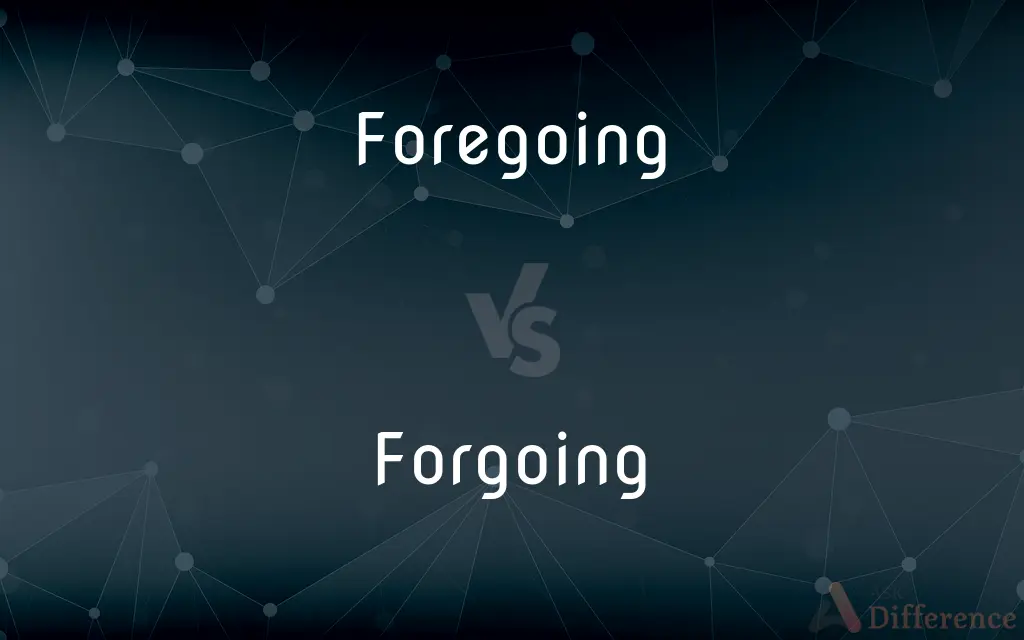Foregoing vs. Forgoing — What's the Difference?
By Tayyaba Rehman & Maham Liaqat — Updated on March 21, 2024
Foregoing refers to something that came before or precedes, while forgoing means to abstain from or do without something.

Difference Between Foregoing and Forgoing
Table of Contents
ADVERTISEMENT
Key Differences
Foregoing is often used to describe information, details, or items that have been mentioned previously in a text or conversation. It acts as a referential term, pointing back to content that has already been introduced. On the other hand, forgoing implies a conscious decision to omit, skip, or give up something. This distinction is crucial in legal, literary, and everyday contexts to convey accurate intentions.
In legal documents, the term "foregoing" is frequently employed to refer to previously stated facts, conditions, or clauses within the document, ensuring clarity and continuity. Forgoing, however, is rarely used in legal contexts but might be found in agreements where parties agree to waive certain rights or entitlements.
In literature, "foregoing" can be used to draw attention to earlier parts of a narrative or argument, helping to weave complex ideas together. Whereas "forgoing" in literary texts often highlights character decisions, underscoring themes of sacrifice or restraint.
In everyday language, "the foregoing" might be used in summaries or conclusions to encapsulate earlier points made in a discussion or presentation. Forgoing, conversely, appears in conversations about personal choices or lifestyle changes, such as forgoing plastic to help the environment.
Technical manuals or guidelines may use "foregoing" to refer to preceding sections or instructions, aiding in navigation and understanding. Forgoing, though less common in this context, could be mentioned in advice or recommendations to avoid certain practices for safety or efficiency.
ADVERTISEMENT
Comparison Chart
Definition
Refers to something preceding or previous.
Means to abstain from or do without.
Usage Context
Legal documents, literature, summaries.
Personal choices, agreements, lifestyle changes.
Connotation
Neutral, indicating reference to prior content.
Involves a sense of sacrifice or decision-making.
Example Sentences
"As mentioned in the foregoing paragraph..."
"I am forgoing coffee for health reasons."
Key Distinctions
Foregoing is backward-looking.
Forgoing is action-oriented, focusing on omission.
Compare with Definitions
Foregoing
The part of a document that comes before a certain point.
Refer to the foregoing section for more details.
Forgoing
To abstain or refrain from something.
She is forgoing her morning latte to save money.
Foregoing
Pertaining to something that has been mentioned previously.
The foregoing statements summarize our findings.
Forgoing
To relinquish or waive a right.
By signing this document, you're forgoing any claims to the property.
Foregoing
Prior to what has been discussed.
The foregoing discussion sets the stage for our next topic.
Forgoing
To omit or skip voluntarily.
He's forgoing the party to study for exams.
Foregoing
In the context of time, occurring before.
The foregoing century witnessed unprecedented changes.
Forgoing
To choose not to engage in or with something.
They're forgoing traditional marketing in favor of digital channels.
Foregoing
Preceding in a sequence or text.
The argument is based on the foregoing evidence.
Forgoing
To give up or do without by choice.
Forgoing dessert is part of his new diet plan.
Foregoing
Said, written, or encountered just before; previous
Refer to the foregoing figures.
Forgoing
To abstain from; relinquish
Unwilling to forgo dessert.
Foregoing
Especially of writing or speech; going before
Forgoing
Present participle of forgo
Forgoing
The act of renouncing; sacrificing or giving up or surrendering (a possession or right or title or privilege etc.)
Common Curiosities
Can "forgoing" be used in formal writing?
Yes, especially to convey deliberate omission or abstention in a formal context.
What does "foregoing" mean in legal documents?
It refers to information, clauses, or details previously mentioned within the document.
Is "foregoing" only used to reference text?
Primarily, yes, though it can also refer to events or conditions that happened earlier.
Can "forgoing" indicate a permanent decision?
It can, though it often describes temporary or specific instances of abstention.
How do "foregoing" and "forgoing" differ in their sense of time?
"Foregoing" looks back to what has already been discussed, while "forgoing" is about the present decision affecting future action or condition.
Why is "forgoing" important in personal decisions?
It reflects conscious choice and often personal sacrifice for greater benefits or values.
How is "forgoing" used in lifestyle changes?
It's commonly used to describe the decision to eliminate certain habits, foods, or practices.
Is "foregoing" always negative?
No, it's neutral, indicating reference to something mentioned before without implying negativity.
Can "forgoing" be seen as a form of self-discipline?
Yes, as it involves voluntarily choosing not to do or have something.
What is the difference between "forgo" and "forego"?
"Forgo" means to abstain from, while "forego" is a less common variant of "forgo" but can also mean to precede.
Can "forgoing" have positive outcomes?
Yes, such as improving health or finances by abstaining from certain habits or expenses.
How does "foregoing" enhance clarity in documents?
By explicitly referring back to earlier points, it helps ensure the reader understands the continuity of ideas.
Can "foregoing" refer to a specific part of a text?
Yes, it often points to a specific section, clause, or argument previously mentioned.
Does "foregoing" imply that what follows is less important?
Not necessarily; it simply denotes that what follows builds upon or differs from what has been previously stated.
Is it common to mix up "foregoing" and "forgoing"?
Yes, due to their similar spelling and pronunciation, but their meanings and uses are distinct.
Share Your Discovery

Previous Comparison
Staid vs. Stayed
Next Comparison
Moonroof vs. SunroofAuthor Spotlight
Written by
Tayyaba RehmanTayyaba Rehman is a distinguished writer, currently serving as a primary contributor to askdifference.com. As a researcher in semantics and etymology, Tayyaba's passion for the complexity of languages and their distinctions has found a perfect home on the platform. Tayyaba delves into the intricacies of language, distinguishing between commonly confused words and phrases, thereby providing clarity for readers worldwide.
Co-written by
Maham Liaqat













































